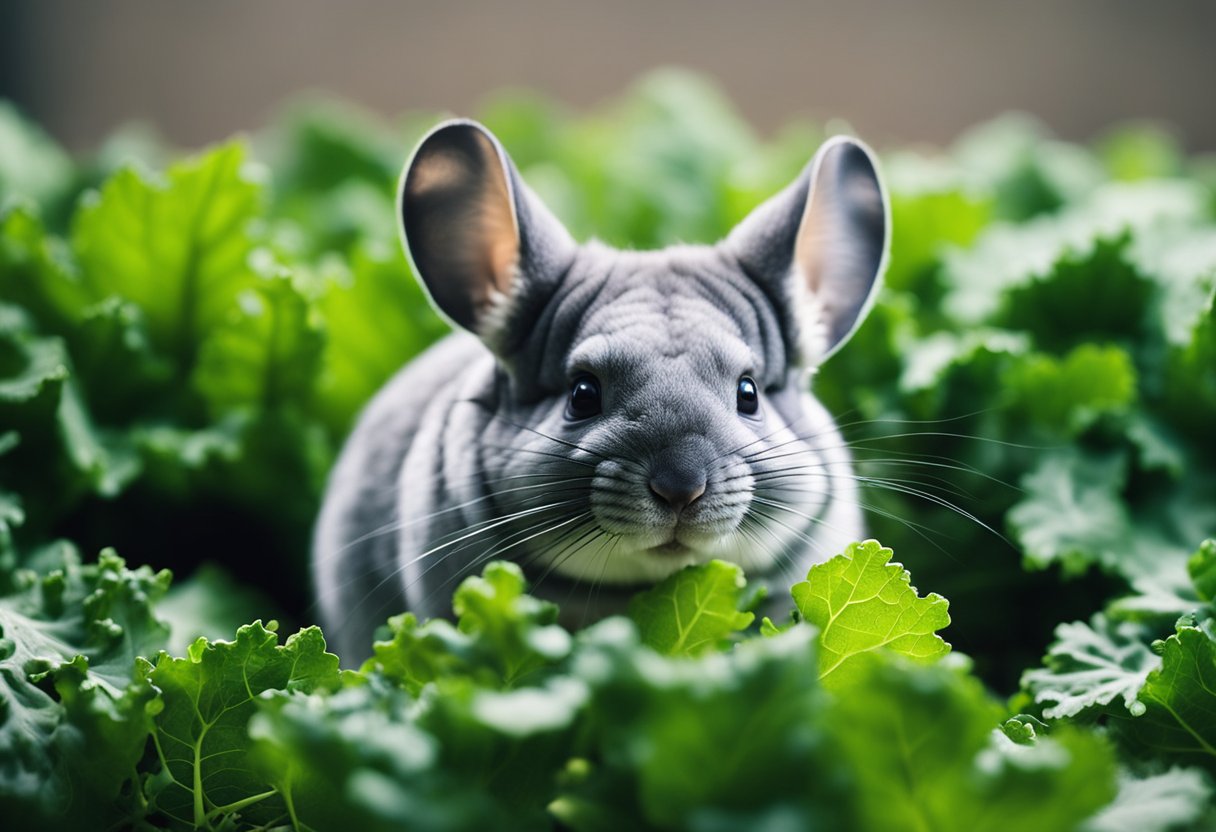Kale is a popular leafy green known for its health benefits, but can it be part of your chinchilla’s diet? Chinchillas can eat kale, but only in small amounts and occasionally. While kale contains vitamins and minerals, it also has high calcium and oxalate levels, which can be harmful if eaten in excess.

Understanding how to feed your chinchilla is key to keeping them healthy and happy. As a responsible pet owner, you want to make informed choices about what to give them. This article will explore the nutritional profile of kale, its suitability for chinchillas, and how to safely incorporate it into their diet.
Key Takeaways
- Kale can be offered to chinchillas in moderation.
- The nutritional content of kale includes beneficial vitamins but has some risks.
- Safe feeding practices are essential for your chinchilla’s health.
Nutritional Profile of Kale

Kale is packed with essential vitamins, minerals, and antioxidants that can benefit your chinchilla in small amounts. Understanding its nutritional profile can help you make informed decisions about including it in their diet.
Vitamin Content in Kale
Kale is an excellent source of vitamins A, C, and K.
- Vitamin A promotes good vision and supports skin health.
- Vitamin C acts as an antioxidant, helping to protect cells from damage and strengthening the immune system.
- Vitamin K is crucial for proper blood clotting and bone health.
These vitamins contribute to overall health, but keep in mind that too much can be harmful. You should only offer kale as an occasional treat, benefiting from its vitamins without overwhelming your pet’s system.
Mineral Composition of Kale
In addition to vitamins, kale contains several important minerals.
- Calcium is essential for bone health and helps prevent osteoporosis.
- Iron is vital for transporting oxygen in the blood and preventing anemia.
- Magnesium supports muscle and nerve function.
Kale provides these minerals, but excessive calcium can lead to kidney issues. Monitor your chinchilla’s intake and make sure they have a balanced diet that includes other calcium sources.
Fiber and Antioxidants in Kale
Kale is rich in dietary fiber, which aids digestion.
- A diet high in fiber helps prevent constipation and promotes a healthy gut.
- Fiber also plays a role in maintaining a healthy weight.
In addition to fiber, kale is a good source of antioxidants. Antioxidants help protect your chinchilla’s cells from damage due to free radicals.
This combination of fiber and antioxidants makes kale a nutritious choice, but remember to feed it in moderation. Too much kale can upset your pet’s digestive balance.
Feeding Chinchillas Kale

Kale can be a nutritious addition to your chinchilla’s diet when given with care. It is important to consider both its benefits and risks, as well as how much you should feed your pet.
Benefits of Kale for Chinchillas
Kale is packed with vitamins and minerals that can support your chinchilla’s health. It contains high levels of Vitamin C, which is essential for their immune system. Additionally, kale has calcium, which is important for bone health.
The fiber in kale also helps maintain a healthy digestive system. While not the only vegetable you can offer, kale provides some uniqueness compared to other greens, making it a potential treat your pet may enjoy.
Risks Associated with Kale
Despite its benefits, kale should be approached with caution. High water content can lead to digestive issues if your chinchilla eats too much. Symptoms like diarrhea or bloating might occur.
Furthermore, if kale is not prepared properly, tough stems or fibrous parts may pose a choking hazard. Always monitor your chinchilla for any adverse reactions after feeding kale, and consult a vet if any concerning symptoms appear, such as lethargy.
Proper Serving Size and Frequency
When feeding your chinchilla kale, moderation is key. Aim to serve only a small portion, about one or two leaf pieces at a time. Limiting servings to once or twice a week helps prevent digestive issues.
Make sure to wash kale thoroughly to remove any pesticides or dirt. Chop the leaves into smaller, manageable pieces to assist your chinchilla in chewing. Avoid cooked kale, as it can lose nutritional value and isn’t suitable for chinchillas.
Resources
For more information on feeding your chinchilla kale safely, you can visit Planet Chinchilla and Love My Chinchilla. These websites provide detailed guidelines on the proper diet and care for your pet. Following their advice ensures your chinchilla stays healthy while enjoying this treat in moderation.
Frequently Asked Questions

You may have questions about what foods are safe for your chinchilla. It’s important to ensure your pet has a healthy and balanced diet. Here are some common inquiries regarding chinchilla nutrition.
What vegetables are safe for chinchillas to consume?
Chinchillas can only eat a few vegetables safely. Safe options include small amounts of kale, but it should not replace their main diet of hay. Always introduce new vegetables gradually and monitor for any digestive issues.
Are leafy greens a healthy option for chinchillas?
Leafy greens can be offered to chinchillas, but only in limited amounts. While greens like kale provide some vitamins and minerals, their high water content can lead to digestive upset if fed too often. Stick to giving greens as occasional treats.
How often can chinchillas eat vegetables?
Chinchillas should have vegetables as a rare treat. You can offer small portions once or twice a week, ensuring it’s just a small part of their overall diet. Don’t let vegetables take the place of hay or pellets.
What are some toxic foods to avoid for chinchillas?
Several foods are harmful to chinchillas. Avoid chocolate, caffeine, and sugary or fatty foods. Some fruits and vegetables, like onions and garlic, can also be toxic, so always check before feeding them to your pet.
Can chinchillas have carrots in their diet?
Carrots should be given sparingly. They contain sugar, which is not ideal for chinchillas. If you decide to offer carrots, do so only as an occasional treat and in small amounts.
What should I consider when feeding my chinchilla fresh foods?
When giving fresh foods to your chinchilla, wash them thoroughly to remove any chemicals or pesticides. Always remove tough stems and chop the pieces into small, manageable sizes. Monitor your pet for any negative reactions after trying new foods.

